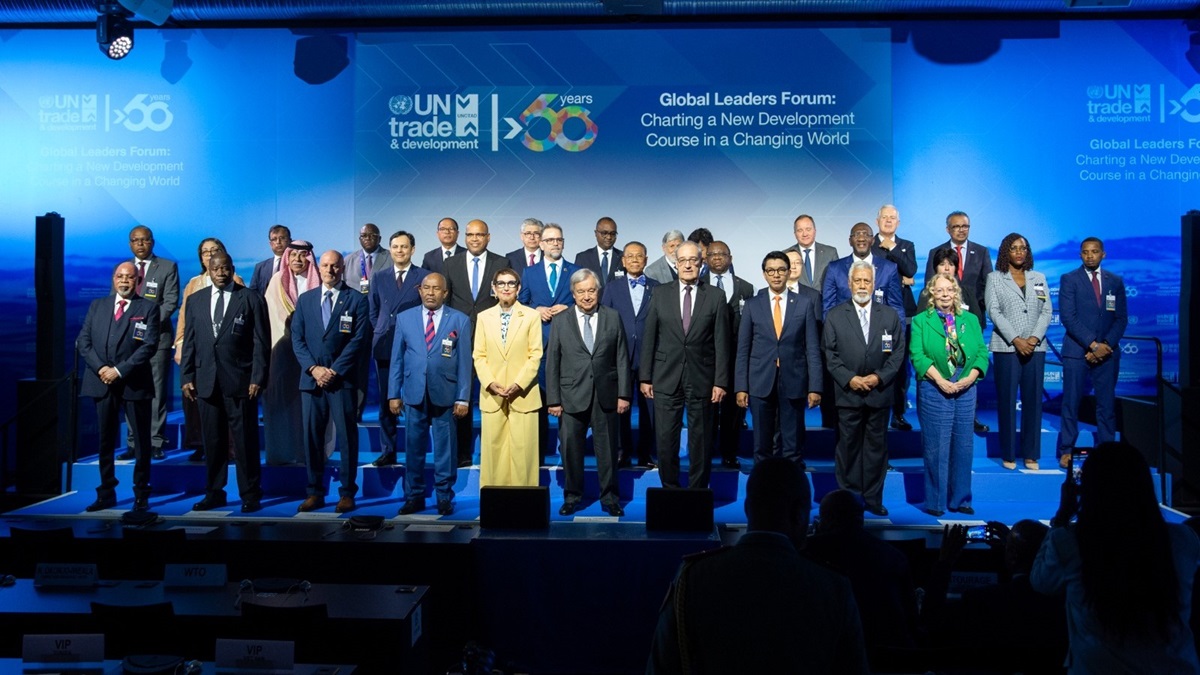The three-day gathering analyzed challenges in global trade disruptions, soaring public debt, climate change, and international finance and investment.
UN Secretary-General António Guterres opened the UN Trade and Development (UNCTAD) Global Leaders Forum, marking the 60th anniversary of the organization, with the Secretary-General of UNCTAD, Rebeca Grynspan, and heads of state and government, 28 ministers of trade and foreign affairs, civil society and private sector representatives, leading economists and heads of international organizations from across the world. See photo highlights.
Under the theme “Charting a new development course in a changing world,” over 1,100 participants from 152 countries convened in Geneva for the three-day forum. The event aimed to shape a vision for inclusive prosperity amidst global crises, trade disruptions, mounting debt burdens and the severe impact of climate change on developing countries.
Mr. Guterres highlighted UNCTAD’s essential role in promoting inclusive and sustainable development through trade and investment and commended the reforms initiated by Secretary-General Grynspan.
Strong presence of the Global South
Support and recognition came from the leaders of countries reflecting the diversity of the Global South.
Presidents Xi Jinping of China, Luiz Inácio Lula da Silva of Brazil, Azali Assoumani of Comoros, Miguel Diaz-Canel of Cuba, Luis Abinader of the Dominican Republic, Andry Nirina Rajoelina of Madagascar, and Prime Ministers Mia Mottley of Barbados and Kay Rala Xanana Gusmão of Timor-Leste recognized UNCTAD’s key role in advocating for developing countries' access to the benefits of a global economy. They also praised UNCTAD’s efforts in advancing South-South cooperation and North-South dialogue.
Global leaders echoed the recognition by UN Secretary-General Guterres, stating that today UN Trade and Development was more relevant than ever.
In addition, China announced a $20 million support package for UNCTAD’s work in implementing the 2030 Agenda for Sustainable Development over the next five years.
Strengthened multilateralism and a key role for UNCTAD
Leaders commended the growing effectiveness of UNCTAD in helping developing countries participate in the global economy. They praised its expert policy analysis on the challenges of global trade for developing economies, including new green industrial policies, foreign direct investment, the international financial architecture, the challenges of the digital economy and the disruption of global value chains.
UN Trade and Development Secretary-General Rebeca Grynspan highlighted that many of the world’s poorest populations remain vulnerable to economic instability, environmental degradation and growing debt burdens. She voiced the organization’s commitment to supporting developing economies through an open and fair multilateral trading system. Ms. Grynspan emphasized the need to renew trust by amplifying the voices of developing countries.
Trade disruptions, industrial policies, digital economy and debt
Analysts examined disrupted global supply chains amidst escalating geopolitical tensions and the persistent asymmetry of the global economy in the digital age. They also explored cascading crises, sustainable industrial policies and the need to revitalize falling foreign direct investment.
The consensus was that industrial policies and structural changes should occur in a socially inclusive and sustainable manner to ensure social stability and protect populations of developing countries.
Thought leaders in the digital economy stressed the importance of including voices from the Global South in artificial intelligence (AI) governance discussions. This inclusion is crucial to support the development of contextual and adaptable AI. They highlighted the need for international cooperation and inclusive policy development, advocating for an international regulatory framework for AI developments.
Leading economists took the stage on the final day for a "Special voices" session. Ranging from promoting trade as a critical engine for development to reforming the international financial architecture, they highlighted the need for strong institutions and the limitations of one-size-fits-all development approaches.
Special attention was given to the current debt crisis as an example of the financial architecture's inadequacy in adapting to a changing global landscape, especially for developing countries. Experts underscored that at this critical juncture, solutions are needed to reform the international economic system, including steps to address the debt crisis while creating a more resilient and inclusive economic future, as reflected in UNCTAD’s recently published “World of debt”.
UNCTAD’s 60th anniversary celebration underscored the organization's pivotal role in fostering an inclusive and equitable global economy. Leaders emphasized the importance of renewed multilateralism and the need for comprehensive reforms to address global challenges and support developing countries. This commemoration sets the stage for the United Nation’s upcoming Summit of the Future, where UNCTAD will play a significant role in advocating for the Global South, further reinforcing its commitment to sustainable and inclusive development.

